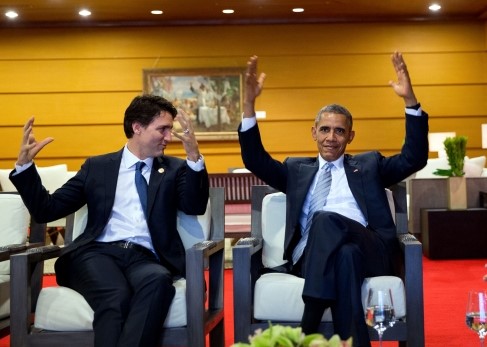The Executive Secretary of the Convention on Biological Diversity, Mr. Braulio Ferreira de Souza Dias, has applauded the Arctic Partnership announced last Thursday by United States President Barack Obama and Canadian Prime Minister Justin Trudeau in Washington, D.C.

Although focused on climate action, the partnership is said to have far-reaching consequences for biodiversity in the Arctic, including the role of indigenous peoples and their traditional knowledge.
Concerned that the Arctic is experiencing accelerated climate change and is on the frontlines of this global crisis, President Obama and Prime Minister Trudeau pledged, in a joint statement, to embrace opportunities and confront challenges in the Arctic with indigenous and Northern partnerships and responsible, science-based leadership.
Of particular relevance to the Convention on Biological Diversity, the two leaders called on all Arctic nations, including those with Arctic interests, to embrace a new future for Arctic leadership with four objectives:
- Conserve Arctic biodiversity through science-based decision-making: Canada and the United States reaffirmed their national goals of protecting at least 17 per cent of land areas and 10 per cent of marine areas by 2020 (Aichi Biodiversity Target 11 of the Strategic Plan for Biodiversity 2011-2020), vowing to work directly with indigenous partners, state, territorial and provincial governments to establish a new conservation goal for the Arctic based on the best available climate science and knowledge.
- Incorporate indigenous science and traditional knowledge into decision-making: The two countries said they are committed to collaborating with indigenous peoples and Arctic governments, leaders and communities to more broadly and respectfully include indigenous science and traditional knowledge into decision-making, including environmental assessments, resource management, and advancing the understanding of climate change and how best to manage its effects.
- Build a sustainable Arctic economy: Commercial activities, according to the two countries, will occur only when the “highest safety and environmental standards including national and global climate and environmental goals, and Indigenous rights and agreements” are met. They pledge to work together to develop, in 2016, a shared and science-based standard for considering the life cycle impacts of commercial activities in the Arctic and establish consistent policies for ships operating in the region. With a vision to ensure a future of “abundant Arctic fish”, both countries called for a binding international agreement to prevent unregulated fisheries in the Central Arctic Ocean based on precautionary, science-based principles.
- Supporting strong Arctic communities: Canada and the United Sates commit to defining new approaches and exchanging best practices to strengthen the resilience of Northern and Arctic communities and to continue to support the well-being of Arctic residents while stressing the importance of respecting the rights and territory of indigenous peoples. Among other things, the two countries committed to working in partnership to implement land claims agreements to realise the social, cultural and economic potential of all indigenous and Northern communities. This new partnership, which embraces Northern and indigenous communities and their local and traditional knowledge, together with science, for conservation and sustainable use of biological diversity and climate action, brings renewed hope for a world region which is experiencing accelerated climate change.
